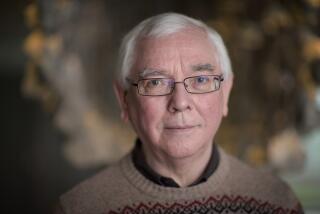He’s working out the Kinks
- Share via
Ray Davies’ contemporaries from the original British Invasion aren’t exactly in their creative primes. Of the few with reasonably active careers 40 years on, only the Rolling Stones have shown a flash of artistic ambition lately, and that flurry on their last album came as a surprise after decades of coasting.
So unless Pete Townshend and Roger Daltrey pull another one with their upcoming Who music, Davies’ new album “Other Peoples’ Lives” figures to stand for a while as that movement’s strongest showing in decades.
How strong is that? Well, when the former leader of the Kinks, who’s generally ranked near if not at the top of the British songwriting heap, played the Wiltern LG on Sunday, he didn’t drop a few of the songs into a corner of the set for a token airing. Instead, he built the show around them, challenging his new work to stand up against the quality and nostalgic appeal of the Kinks classics.
Some did, some didn’t, and they all might have not seemed quite so strong if he’d thrown more of his best Kinks songs at them. But the gesture was inspiring and ultimately rewarded the effort.
“Lives” is billed as Davies’ first solo studio album (some Kinks scholars wonder why his 1985 TV soundtrack “Return to Waterloo” doesn’t count), and this was his first conventional rock concert here since the Kinks came to a halt in 1996.
He spent some years in the late ‘90s performing his intimate, autobiographical “Storyteller” show of songs and reminiscences, but it’s been so long since he’s fronted a band on stage that you had to wonder what aspects of the Kinks’ appeal he would be able (or want) to rediscover.
The members of the Kinks army who nearly filled the Wiltern had nothing to worry about. Davies, 62, might be one of rock’s most notorious neurotics, but he was Mr. Charm on Sunday, still a lithe rock star in straight-legged pants, his voice powerful and plaintive, his spirit exuberant and his heart, as ever, on his sleeve.
He introduced some of the new songs with serious comments on their themes and aims, but he tossed some ham into his salad too, reviving his Kinks music-hall ringmaster persona with some theatrical flair.
Playfully wiggling his hips and illustrating lyrics with graceful hand and body gestures, he was a rock ‘n’ roll harlequin again, and though his work covers a vast thematic and emotional range, he never forgets that this is always supposed to be fun.
Backed by a four-member band that played with scrappy efficiency and no distracting personality, Davies opened with a one-two punch of Kinks that immediately set a high standard and defined the melancholy outsider persona: “I’m Not Like Everybody Else” and “Where Have All the Good Times Gone.”
New songs such as “Run Away From Time,” “The Morning After” and “After the Fall” asserted themselves as evocative additions to Davies’ body of work, not pale facsimiles of older songs. He made the meticulous craft of the writing and arranging seem effortless by the passion of his delivery. The new album, he told his fans, is about guilt and trying to run away.
Even with that foundation, a show like this is also about old favorites, and Davies dealt out the Kinks songs with generosity, if not always the best judgment. Surprising, less obvious choices included “Oklahoma U.S.A.,” a sweet ode to the older sister who shared with him her escape into the movies in the 1950s, and a slow, stately “A Long Way From Home,” dedicated to his brother Dave, the Kinks’ guitarist.
Of the hits, “Sunny Afternoon” was a buoyant sing-along, and he went for a lot of the early, primal power-chord singles: “You Really Got Me,” “All Day and All of the Night,” et al.
Any Davies set list is fuel for debate, but the neglect of the great songs from “The Village Green Preservation Society” and “Arthur,” especially “Waterloo Sunset,” perhaps the most sublime song in the annals of British rock, counts as a disappointment here.
But those raw, British Invasion hits churned things up, and they hold a place for Davies similar to the early Beach Boys singles for Brian Wilson. Often downgraded next to the more sophisticated work that came later, they proved resilient and eloquent in their directness.
“Girl, I want to be with you all of the time, all day and all of the night” is a bracingly pure expression of an infinite appetite for life, and for two hours on Sunday its writer showed that that appetite is undiminished.
More to Read
The biggest entertainment stories
Get our big stories about Hollywood, film, television, music, arts, culture and more right in your inbox as soon as they publish.
You may occasionally receive promotional content from the Los Angeles Times.









